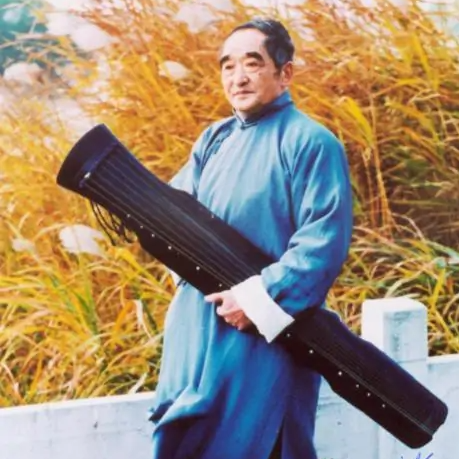Mei Yueqiang

Mei Yueqiang, courtesy name Nanyi, was born in Hukou County, Jiangxi Province in 1929. He was born in Nanjing, Jiangsu Province in 1929. He was a member of China Musicians Association, director of Nanjing Musicians Association, executive director of China Qin Association, member of Nanjing Music Society and Guqin group leader, honorary director of Guangling Qin Society and Mengxi Qin Society, and consultant of Tongshan County Guqin Research Association. The "Guangling School" began in the Shunzhi period in the early Qing Dynasty and has always been the most influential Daqin school. For more than 300 years, it has been inherited in an orderly manner, and famous teachers have been produced in large numbers, and their names are widely distributed in the world.
In 1939, Mei Yueqiang was nurtured by Mr. Wang Jianhou, a guqin master who was a disciple of Zen Master Daxiu, who presided over Zhaodan Temple in Hangzhou. In 1952, he went to the famous Jinling guqin master Xia Yifeng, Ms. Zhao Yunqing, Ms. Xu Tonghua of the Shu School and Mr. Liu Shaochun, the tenth-generation descendant of the Guangling School as teachers. In order to study the art of the Guangling School of Qin, he and Liu Shaochun slept every night.
Mei Yueqiang's playing style of guqin is mainly based on the beauty and delicacy of the Guangling School, the ups and downs, the combination of hardness and softness, and the melodious rhythm. He advocates the harmony of sound and rhythm, the ancient and ancient Mu in the Qing Dynasty, and the combination of nature and cultivation, so as to enter the genre and not be confined to the genre.
Mei Yueqiang worked in Nanjing Normal University as an extracurricular guqin teacher in order to promote traditional Chinese culture in Nanjing for decades. In 1992, the Nanjing Municipal People's Government awarded him the honorary award of the "First Nanjing Literature and Art Award". After retiring, he moved to Yangzhou, where he worked as an extracurricular teacher at Yangzhou Teachers College, and set up "Meiyue Qiangqin Museum" in Yangzhou to revitalize the piano art in Guangling. There are many thousands of miles at home and abroad who come here to join the master, and the world is full of peaches and plums.
Mei Yueqiang has participated in the second, third, and fourth national guqin scoring conferences; in 1990 and 1995, he participated in the International Exchange Conference of Chinese Guqin Art twice. In 1991, the China National Academy of Arts recorded 28 qin pieces for him, which were preserved as national audio materials; in 1992, he served as a judge of the Hangzhou Guqin Invitational Competition. In October 2000, he performed for General Secretary Jiang and French President Chirac, and the guqin he made was presented to President Chirac as a national gift. On December 8, 2002, he held a concert "Guangling Qin Yun" for the 60th anniversary of Caoman at the Guotu Concert Hall, which was a major event in the Guqin world.
In the summer of 2004, Mei Yueqiang died in Nanjing at the age of 75.
Similar artist
Involving musical instruments
Involved portfolio
Involved news
Popular artists
- 01 bump peng peng peng
- 02 Jiang Ying
- 03 Su Chang
- 04 Zhu Yunqi
- 05 Zhong Xiaotian
 渝公网安备 50010702504639号
渝公网安备 50010702504639号